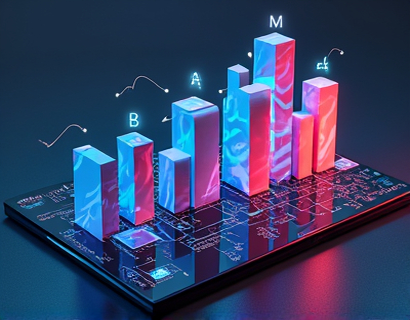Blockchain Data Solutions: Secure Partitioning and Sharing for Enhanced Privacy and Efficiency
In an era where data breaches and privacy concerns are rampant, the need for robust and secure data management solutions has never been more critical. Tech-savvy businesses and privacy-focused individuals are increasingly turning to blockchain technology to address these challenges. Blockchain offers a decentralized and immutable ledger that can significantly enhance data privacy and operational efficiency. This article delves into the cutting-edge blockchain solutions for secure data partitioning and sharing, focusing on how these technologies can be leveraged to protect and optimize data on decentralized networks.
Understanding Blockchain and Its Role in Data Security
Blockchain is a distributed ledger technology that records transactions across multiple computers in such a way that the registered transactions cannot be altered retroactively. This inherent characteristic makes blockchain an ideal solution for ensuring data integrity and security. Each block in the chain contains a cryptographic hash of the previous block, a timestamp, and transaction data. This structure ensures that any attempt to modify past transactions would require altering all subsequent blocks, which is computationally infeasible.
Secure Data Partitioning with Blockchain
Data partitioning involves dividing a dataset into smaller, manageable parts, each stored and processed independently. When combined with blockchain, this process becomes even more secure and efficient. Blockchain enables the creation of smart contracts that define the rules for data access and partitioning. These smart contracts automatically enforce access controls, ensuring that only authorized parties can access specific data partitions. This not only enhances security but also improves data management by allowing organizations to maintain control over their data while leveraging the benefits of decentralization.
Benefits of Secure Data Partitioning
- Enhanced Security:By partitioning data and storing it across multiple nodes, the risk of a single point of failure is minimized. Even if one node is compromised, the entire dataset remains secure.
- Compliance:Many industries are subject to strict data protection regulations. Secure data partitioning helps organizations comply with these regulations by ensuring data is stored and accessed in a controlled manner.
- Scalability:As businesses grow, their data needs increase. Blockchain-based partitioning allows for seamless scaling by adding more nodes to the network without compromising performance.
Data Sharing on Blockchain Networks
Data sharing is a critical aspect of modern business operations, but it often comes with significant security risks. Blockchain provides a transparent yet secure framework for data sharing. Through the use of public and private keys, users can share data with specific parties while maintaining control over who can access it. This ensures that sensitive information is only visible to authorized users, reducing the risk of unauthorized access and data breaches.
Use Cases of Blockchain for Data Sharing
Enhancing Privacy with Blockchain
Privacy is a paramount concern for both businesses and individuals. Blockchain technology offers several features that enhance data privacy. One such feature is zero-knowledge proofs, a cryptographic method that allows one party to prove to another that a statement is true without revealing any information beyond the truth of that statement. This ensures that sensitive data remains confidential while still verifying its authenticity.
Zero-Knowledge Proofs in Action
Zero-knowledge proofs can be used in various scenarios to maintain privacy. For instance, in identity verification, a user can prove their age or identity without disclosing their exact birthdate or personal details. This not only protects the user's privacy but also reduces the risk of identity theft.
Operational Efficiency through Blockchain
Beyond security and privacy, blockchain can significantly improve operational efficiency. The decentralized nature of blockchain eliminates the need for intermediaries, streamlining processes and reducing costs. Smart contracts automate and enforce contractual obligations, ensuring that all parties adhere to the agreed terms without the need for manual intervention.
Automation and Smart Contracts
Smart contracts are self-executing contracts with the terms of the agreement directly written into code. They automatically trigger actions when predefined conditions are met. For example, in a business-to-business transaction, a smart contract can automatically release payment once the goods have been delivered and verified. This reduces the need for manual checks and speeds up the transaction process.
Case Study: Cross-Border Payments
Cross-border payments are a prime example of where blockchain can enhance efficiency. Traditional methods involve multiple intermediaries, leading to high fees and long processing times. Blockchain-based solutions can facilitate direct peer-to-peer transactions, reducing costs and transaction times. Smart contracts ensure that payments are only released when all conditions are met, such as verification of documents and compliance with regulatory requirements.
Challenges and Considerations
While blockchain offers numerous benefits, there are also challenges and considerations that organizations must address when implementing these solutions. Scalability remains a significant issue, as blockchain networks can struggle to handle a high volume of transactions. However, ongoing developments in blockchain technology, such as layer 2 solutions and sharding, are addressing these scalability concerns.
Regulatory Compliance
Another critical aspect is regulatory compliance. Different regions have varying laws and regulations regarding data protection and privacy. Organizations must ensure that their blockchain solutions comply with local and international regulations to avoid legal issues.
Technical Expertise
Implementing blockchain solutions requires a certain level of technical expertise. Organizations may need to invest in training or hire specialists to design and maintain their blockchain systems effectively.
Future Trends in Blockchain Data Solutions
The future of blockchain data solutions is promising, with ongoing innovations set to address current challenges and unlock new possibilities. Interoperability between different blockchain platforms is becoming a focus, allowing for seamless data sharing across various networks. Additionally, the integration of blockchain with other emerging technologies like artificial intelligence and the Internet of Things (IoT) is expected to create more sophisticated and efficient data management systems.
Interoperability and Cross-Chain Solutions
Interoperability refers to the ability of different blockchain systems to communicate and exchange data seamlessly. This is crucial for creating a more connected and efficient data ecosystem. Cross-chain solutions enable data to be transferred between different blockchain networks, breaking down silos and enhancing the utility of blockchain data solutions.
Integration with IoT and AI
The integration of blockchain with IoT and AI can lead to innovative applications in various industries. For example, in IoT, blockchain can ensure the secure and transparent exchange of data generated by connected devices. In AI, blockchain can provide a secure and tamper-proof source of data for training machine learning models, enhancing the accuracy and reliability of AI systems.
In conclusion, blockchain data solutions offer a robust and secure framework for data partitioning and sharing, significantly enhancing privacy and operational efficiency. By leveraging the unique features of blockchain, tech-savvy businesses and privacy-focused individuals can protect their data and optimize their operations on decentralized networks. As the technology continues to evolve, the potential applications and benefits of blockchain data solutions will only grow, making it an essential tool for the future of data management.









































